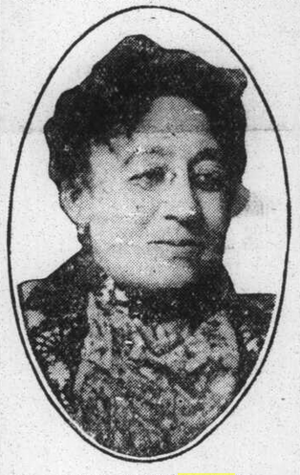M. Cravath Simpson facts for kids
Quick facts for kids
M. Cravath Simpson
|
|
|---|---|

Simpson in 1910
|
|
| Born |
Minnie Mahala Cravat (also shown as Cravath and Cravatt)
December 6, 1860 |
| Died | May 19, 1945 (aged 84) Boston, Massachusetts
|
| Nationality | American |
| Other names | Maud Cravath Simpson, Minnie Simpson, Cravath M. Simpson |
| Occupation | Singer, public speaker, clubwoman, podiatrist |
| Years active | 1891–1940 |
M. Cravath Simpson (born December 6, 1860 – died May 19, 1945) was an African-American activist and public speaker. She started her career as a singer. Later, she studied to become a podiatrist, which is a foot doctor. However, she is best known for her important work to help the black community and fight against unfair violence. Even though she lived in Boston, Simpson traveled and spoke across the Northeastern and Midwestern United States. She asked people to recognize the basic human rights of black citizens.
Contents
Early Life and Family
Mary Mahala Cravat, who was called Minnie, was born on December 6, 1860. Her birthplace was Cumberland, in Providence County, Rhode Island. Her parents were Sarah B. (Eldridge) and John A. Cravat. Minnie was the youngest of three children. She had a brother named Eldridge and a sister named Clara.
Her father was born in Pennsylvania and had a French father. He worked as a barber. He also served in the Union Army during the Civil War. He was part of the Colored Heavy Artillery Unit from 1863 to 1865. After finishing high school in Rhode Island, Minnie Cravat married Charles Harry Simpson. They got married on October 30, 1882, in Providence. After their wedding, they moved to Boston. Minnie continued her studies there and trained to be a contralto singer for seven years.
Career and Activism
Simpson started her singing career in 1891. She even performed at Madison Square Garden. She stopped singing in 1895. After that, Simpson became a public speaker. At the same time, she kept studying at the Boston College of Chiropody. She graduated as a chiropodist in 1911. From 1903 to 1940, she gave speeches all over the Northeastern Seaboard and the Midwest. Her talks focused on stopping lynching and fighting against racial inequality.
Community Work and Clubs
Besides her work as a podiatrist and speaker, Simpson was very active in women's clubs. She helped start important groups like the Woman's Era Club in 1892. She was the secretary for this club for 14 years. She also helped create the Harriet Tubman House in 1903.
The Era Club and its founder, Josephine St. Pierre Ruffin, encouraged the creation of the National Association of Colored Women's Clubs. Simpson joined this group when it was formed in 1896. In the same year, the Northeastern Federation of Women's Clubs was founded. Simpson became a member and led its anti-lynching committee. She later became the leader of the entire Federation in 1918.
Fighting for Rights
In 1908, William Monroe Trotter started the Negro-American Political League. This group separated from the NAACP. The main disagreement was whether black people should lead the organization or if white people could also be leaders. Simpson, along with other important figures like Pauline Hopkins and Ida B. Wells, supported this new effort.
Around 1911, Simpson became president of the Anti-Lynching Society of Afro-American Women. She also led the creation of the Massachusetts State Union of Black Women's Clubs in 1914. She was its first president from 1914 to 1916 and served again from 1922 to 1924. In all her different roles, she worked hard to protect the human rights of African Americans. She wanted to make sure they received respect, equality, and justice.
Death and Lasting Impact
In February 1945, a fire broke out in Simpson's apartment building. She was taken to the hospital because of the shock. She passed away three months later, on May 19, 1945, in Boston. In 1968, the newspaper The Boston Globe recognized her as one of Boston's "Black Brahmins." These were remarkable people who, even if they weren't revolutionaries themselves, helped prepare the way for the later Civil Rights Movement.
 | James Van Der Zee |
 | Alma Thomas |
 | Ellis Wilson |
 | Margaret Taylor-Burroughs |

